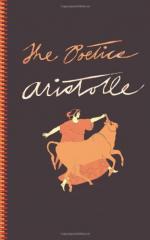
|
| Name: _________________________ | Period: ___________________ |
This quiz consists of 5 multiple choice and 5 short answer questions through Section I.
Multiple Choice Questions
1. When one character realizes that another character has fewer morals than he once thought, what does Aristotle say is happening?
(a) Growth.
(b) Bad judgment.
(c) Opportunity.
(d) Recognition.
2. The object poetry portrays is what, according to Aristotle?
(a) Various places around the world.
(b) Other poets.
(c) Tragic events.
(d) Men in action.
3. How does Aristotle compare the medium of poetry and prose?
(a) Both use the same medium.
(b) It is nothing like prose.
(c) Both use the same medium and meter.
(d) Both use the same medium and rhythm.
4. Aristotle explains that actions described in a tragic plot should have certain characteristics. Which one of the following is NOT one of the characteristics that Aristotle identifies?
(a) Actions should be interesting.
(b) Actions should be not too small or too large.
(c) Actions should help the reader grasp the significance of the whole.
(d) Actions should be minute and trivial.
5. Aristotle says that at most, episodic plots involve what?
(a) Sad middle and happy ending.
(b) Strange irony.
(c) Disconnected foreshadowing.
(d) The same characters.
Short Answer Questions
1. When a poet presents the poem in the voice of one of the characters, what method does Aristotle say that the poet is using?
2. What is one of the requirements Aristotle mentions for a good tragic plot?
3. How does Aristotle differentiate poetry from prose?
4. How does Aristotle say the different types of poetry emerged?
5. Per Aristotle, the unity of plot is what to the unity of a character's actions?
|
This section contains 339 words (approx. 2 pages at 300 words per page) |

|




